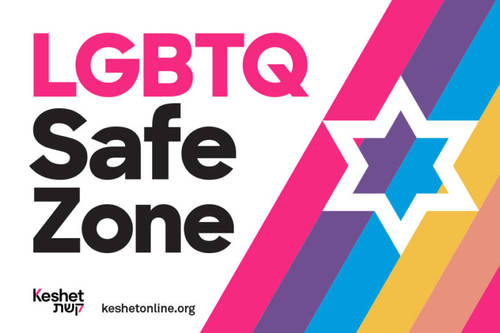Nisreen Ibrahim
04/13/2017 10:17:19 AM
| Author | |
| Date Added |
By Eric Futterman
On the second night of Passover 2017, in the large basement dining hall of a Richmond, Virginia synagogue, 200 people—Jews, Muslims and Christians—waged peace.
Gathered around dozens of tables filled with a cornucopia of food and wine and adorned with the symbolic dishes that define the Passover Seder, Temple Beth-El’s Rabbi Michael Knopf commenced this most unusual Seder by imploring everyone there to “imagine ourselves as though we personally went forth from Egypt…to experience being victimized because of who we are.”
As he spoke hundreds of eyes turned to the 50 people scattered around those tables who did not need to imagine such an experience. Until the last few months, they have been living it.
These refugees from Syria, Iraq and Afghanistan were part of an endeavor by Rabbi Knopf, the non-profit organization ReEstablish Richmond, and the Temple Israel Congregation to help these victims of violence and chaos settle into Richmond and become a part of the tapestry of American society.
During a break in the Seder two of these refugees stood and spoke before this large group; telling of their own exodus from war, famine, and unimaginable violence.
One of the women who spoke was 32-year-old Nisreen Ibrahim. She spoke haltingly, with tears streaming, of how her father, a Sunni, was gunned down in his car in 2007 by Shiite militia, as part of the civil war that erupted following the 2003 U.S. invasion of Iraq. Sunnis and Shiites have been in conflict since the death of the Prophet Muhammad in 632 AD over the leadership and direction of the Muslim faith.
Nisreen has been in the U.S. since late 2016. She works at Staples and was studying to be an engineer in Iraq. Two wars and violence at every turn led her to escape.
I spoke with Nisreen two weeks before the Seder to learn about her story and her experience escaping violence in Iraq, then Syria and Turkey before gaining a visa to the United States. What she has seen with her own eyes is something most Americans could not begin to imagine.
“ISIS, al Qaeda…all of them, I've seen them. They've killed people in front of me, actually. So I saw them. When I was in Iraq and Syria and Turkey too, actually. They take their religion in the bad way. I don't know why. Religion is not a reason to kill people.”
When she left Iraq for Syria, Nisreen arrived as Syrian President Bashar Al-Assad was escalating the war there; creating chaos and abject fear. Where were the next bombs going to be dropped? Whose bodies would be torn apart by these powerful weapons of war?
“Actually I've seen the bombs come from the sky. Came from the helicopters and my God, in the place where I lived, there's 270 people killed in just one hour. And I wait, actually I wait then, I said maybe they kill me too. They just go to the houses and take the men to the street and kill them, just like that.”
|
What is remarkable about Nisreen, a tall, confident woman making her way in yet another country, is how all the violence and extremism has not swayed her from her love of humanity. She even finds it in her heart to love so many of the people who gunned down her friends and family. Echoing Martin Luther King Jr.’s sentiment Nisreen says, “I actually I see the personality of the human being, not their religion or from where they are, or their color.” And that was the point of this particular Seder. Jews learned about Muslims and how people bastardizing their religion resort to horrific violence. Muslims learned of a beautiful Jewish tradition, the Passover Seder, and how the holiday commemorates the life of a people on the run from hatred and violence; all while sampling both the sour and sweet tastes of the Passover menu that symbolizes enslavement and escape to freedom. They listened politely and enjoyed the equally sweet voice of Hazzan Marian Turk as she sang prayers leading into the celebratory meal. At one point, Rabbi Knopf asked everyone who could cite stories of ancestors escaping persecution to stand. Nearly everyone, Jew, Muslim and Christian, stood up; thinking of a grandparent or uncle or even a parent, who came here, tired, desperate and seeking refuge. “I love it,” Nisreen says with a smile that reveals the feeling that she is finally free. “I think when we set dishes together, it's just like there's peace and a lovely atmosphere. I like this because we communicate with each other just because we are human beings, not, I'm Muslim, your Jewish.” And with this particular Passover Seder, the Jewish community of Richmond, Virginia dropped a pebble of peace in the water of humanity. With hugs and handshakes and smiles, that peace has now begun to spread throughout our community. |
Sun, September 14 2025
21 Elul 5785
Weekly Services
Logged in visitors: Click here for service information
Virtual Option
All Shabbat and Holiday services are no longer on Zoom, but continue to stream live on Youtube:
Minyan Services remain on the original Zoom link:
https://zoom.us/j/6447146026
Meeting ID: 644 714 6026
Temple Beth-El receives a percentage of sales at Kosher Wine when you use this link, or if you've ordered within 7 days you can go to www.kosherwine.com/give-back and apply our charity code: 8383530
Privacy Settings | Privacy Policy | Member Terms
©2025 All rights reserved. Find out more about ShulCloud





